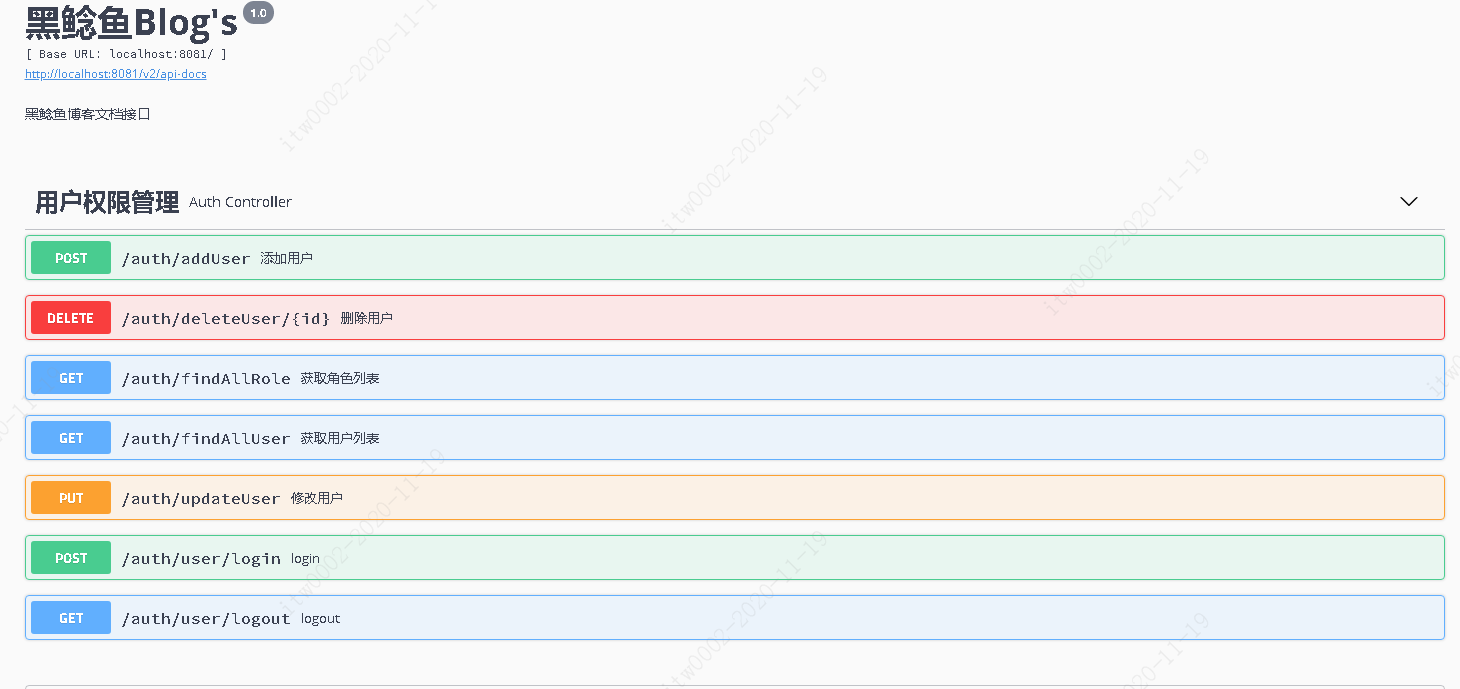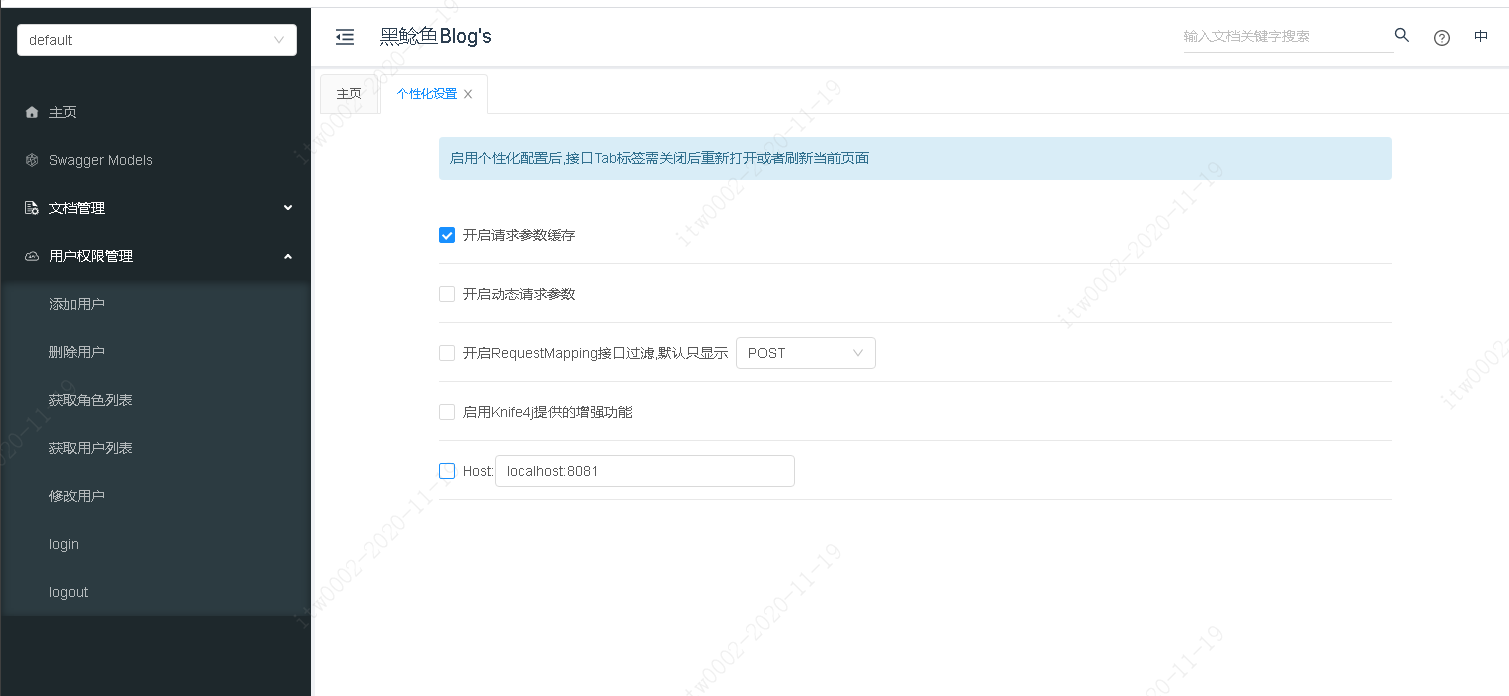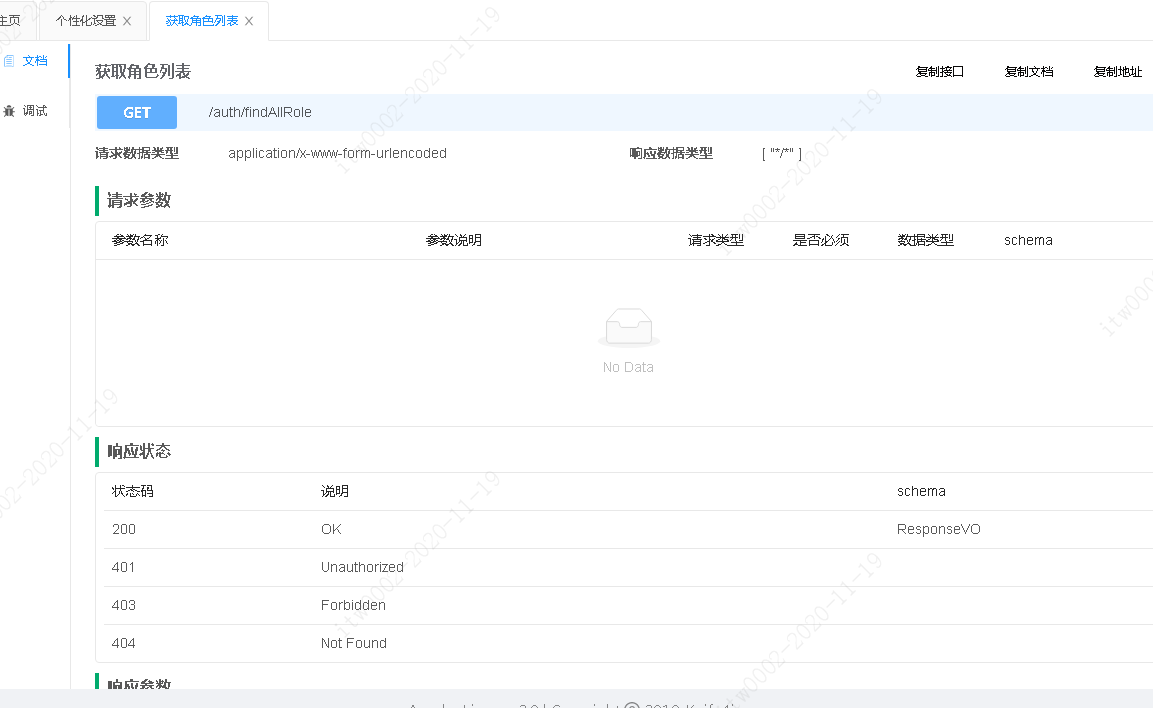Springboot 基于swagger 整合Knife4j
程序员在开发过程中讨厌和不想做的就是写接口文档了吧(反正我是这么回事,写文档没啥技术性浪费时间)后来得知了swagger 简直是程序员的福音了吧! swagger官网
首先正常使用的一个东西肯定要引入依赖了
<dependency> <groupId>io.springfox</groupId> <artifactId>springfox-swagger2</artifactId> <version>2.9.2</version> </dependency> <dependency> <groupId>io.springfox</groupId> <artifactId>springfox-swagger-ui</artifactId> <version>2.9.2</version> </dependency>
将上面的代码块引导自己项目中之后也别忘了配置
SwaggerConfig.class
package com.unionman.springbootsecurityauth2.config; import com.github.xiaoymin.knife4j.spring.annotations.EnableKnife4j; import org.springframework.context.annotation.Bean; import org.springframework.context.annotation.Configuration; import springfox.documentation.builders.ApiInfoBuilder; import springfox.documentation.builders.PathSelectors; import springfox.documentation.builders.RequestHandlerSelectors; import springfox.documentation.service.ApiInfo; import springfox.documentation.service.Contact; import springfox.documentation.spi.DocumentationType; import springfox.documentation.spring.web.plugins.Docket; import springfox.documentation.swagger2.annotations.EnableSwagger2; /** * @program: blackCatFish * @description: Swagger配置类 * @author: zly * @create: 2020-11-06 15:06 **/ @EnableKnife4j
//开启Swagger @EnableSwagger2 @Configuration public class SwaggerConfig { /** * 创建API应用 * apiInfo() 增加API相关信息 * 通过select()函数返回一个ApiSelectorBuilder实例,用来控制哪些接口暴露给Swagger来展现, * 本例采用指定扫描的包路径来定义指定要建立API的目录。 */ @Bean public Docket createRestApi() { return new Docket(DocumentationType.SWAGGER_2).apiInfo(apiInfo()).select() .apis(RequestHandlerSelectors.basePackage("com.unionman.springbootsecurityauth2.controller")).paths(PathSelectors.any()).build(); } /** * 创建该API的基本信息(这些基本信息会展现在文档页面中) * 访问地址:http://项目实际地址/swagger-ui.html */ private ApiInfo apiInfo() { return new ApiInfoBuilder().title("黑鲶鱼Blog's").description("黑鲶鱼博客文档接口") .contact(new Contact("BlackCatFish", "", "")).version("1.0").build(); } }
apis(RequestHandlerSelectors.basePackage("com.unionman.springbootsecurityauth2.controller") 扫描这个包下面的所有controller
Swagger中常用的注解
| 序号 | 注解 | 用法 |
| 1 | @Api | 用于类准确的说是用于controller表示这个类是swagger资源 |
| 2 | @ApiModel | 用于实体类标识对类进行说明用于参数实体类接收 |
| 3 | @ApiOperation | 用于方法,标识一个http请求 |
| 4 | @ApiModelPropertiy | 用于方法字段,标识对于属性的说明 |
| 5 | @ApiParam | 用于请求参数,标识请求参数的说明 |
| 6 | @ApiIgnore() | 用于类,方法,方法参数 表示这个方法或者类被忽略 |
| 7 | @ApiImplicitParam() | 用于方法 表示单独的请求参数 |
| 8 | @ApiImplicitParams() | 用于方法,包含多个 @ApiImplicitParam |
实体类代码
@Getter @Setter @Entity @Table(name = "um_t_user") @ApiModel("用户实体类") public class User extends Base implements Serializable { private static final long serialVersionUID = -8478114427891717226L; /** * 用户账号 */ @ApiModelProperty("用户账号") @Length(max = 50,message = "用户账号不能超过50长度") private String account; /** * 用户名 */ @ApiModelProperty("用户账号") @Length(max = 50,message = "用户账号不能超过50长度") private String name; /** * 用户密码 */ @ApiModelProperty("用户密码") @JsonIgnore private String password; /**
ps @Length是对字段的长度的限制,@JsonIgnore返回json格式数据可不返回这个字段
controller
package com.unionman.springbootsecurityauth2.controller; import com.unionman.springbootsecurityauth2.dto.LoginUserDTO; import com.unionman.springbootsecurityauth2.dto.UserDTO; import com.unionman.springbootsecurityauth2.service.RoleService; import com.unionman.springbootsecurityauth2.service.UserService; import com.unionman.springbootsecurityauth2.utils.AssertUtils; import com.unionman.springbootsecurityauth2.vo.ResponseVO; import io.swagger.annotations.Api; import io.swagger.annotations.ApiOperation; import lombok.extern.slf4j.Slf4j; import org.springframework.beans.factory.annotation.Autowired; import org.springframework.security.oauth2.provider.token.store.redis.RedisTokenStore; import org.springframework.validation.annotation.Validated; import org.springframework.web.bind.annotation.DeleteMapping; import org.springframework.web.bind.annotation.GetMapping; import org.springframework.web.bind.annotation.PathVariable; import org.springframework.web.bind.annotation.PostMapping; import org.springframework.web.bind.annotation.PutMapping; import org.springframework.web.bind.annotation.RequestBody; import org.springframework.web.bind.annotation.RequestHeader; import org.springframework.web.bind.annotation.RequestMapping; import org.springframework.web.bind.annotation.RestController; import javax.validation.Valid; /** * @author zly * @description 用户权限管理 * @date 2019/4/19 13:58 */ @Slf4j @Validated @RestController @RequestMapping("/auth/") @Api(tags = "用户权限管理") public class AuthController { @Autowired private UserService userService; @Autowired private RoleService roleService; @Autowired private RedisTokenStore redisTokenStore; /** * @param userDTO * @return * @description 添加用户 */ @PostMapping("addUser") @ApiOperation("添加用户") public ResponseVO add(@Valid @RequestBody UserDTO userDTO) throws Exception { userService.addUser(userDTO); return ResponseVO.success(); } /** * @param id * @return * @description 删除用户 */ @DeleteMapping("deleteUser/{id}") @ApiOperation("删除用户") public ResponseVO deleteUser(@PathVariable("id") Integer id) throws Exception { userService.deleteUser(id); return ResponseVO.success(); } /** * @param userDTO * @return * @descripiton 修改用户 */ @PutMapping("updateUser") @ApiOperation("修改用户") public ResponseVO updateUser(@Valid @RequestBody UserDTO userDTO) { userService.updateUser(userDTO); return ResponseVO.success(); } /** * @return * @description 获取用户列表 */ @GetMapping("findAllUser") @ApiOperation("获取用户列表") public ResponseVO findAllUser() { return userService.findAllUserVO(); } /** * @param loginUserDTO * @return * @description 用户登录 */ @PostMapping("user/login") public ResponseVO login(LoginUserDTO loginUserDTO) { return userService.login(loginUserDTO); } /** * @param authorization * @return * @description 用户注销 */ @GetMapping("user/logout") public ResponseVO logout(@RequestHeader("Authorization") String authorization) { redisTokenStore.removeAccessToken(AssertUtils.extracteToken(authorization)); return ResponseVO.success(); } /** * @return * @description 获取所有角色列表 */ @GetMapping("findAllRole") @ApiOperation("获取角色列表") public ResponseVO findAllRole() { return roleService.findAllRoleVO(); } }
启动项目访问://http:ip:prot/swagger-ui.html
如图所示

到这来似乎和我讲的Knife4j没有关系哦 久等了
老套路在依赖中添加
<dependency> <groupId>com.github.xiaoymin</groupId> <artifactId>knife4j-spring-boot-starter</artifactId> <!--在引用时请在maven中央仓库搜索最新版本号--> <version>2.0.4</version> </dependency>
在Swagger配置类中加上开启knife4j的注解
@EnableKnife4j

在访问http:ip:prot/doc.html
如下图

点开某个接口

对比swagger界面knife4j支持全文搜索接口,可以给接口添加一些请求头,测试接口功能比swagger增强些比postman弱 q_q 界面更好看写(个人视觉)
自从接触到knife4j我更喜欢这个,你呢
努力提高自己的技术,不忘初心


 浙公网安备 33010602011771号
浙公网安备 33010602011771号